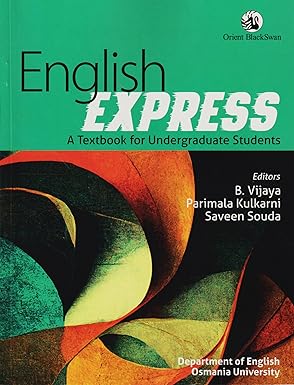Course Summary
The course is a general elective paper which offers basic idea about computers and its terminologies. It also helps students to understand the emerging trends in IT .This course covers all the various aspects of computer networking and security. The topics covered in syllabus collectively equip students with the knowledge and skills needed to deal with technology effectively across various domains, from software development and data analytics and IT management. This course as general elective it will help students to be aware about different threats and security issues in IT also.

- Teacher: SHIMA A. N.
The General English course English Express comes handy to cater to students’ needs who would embark on a new journey after their undergraduate studies. During the course of their last semesters, students get exposure to experiential learning, especially with live projects and campus interviews, and the English course prepares them to face these challenges. All the texts in the coursework are carefully picked to enable them to gain pragmatic experiences of life apart from exposing them to the apparent reflections of varied human societies and cultures. The texts also enable them to think critically and comprehend the implicit values they convey.

- Teacher: Dr SAIKIRAN D
- Teacher: Dr MANOJ KANTH SIRRA
The main objective of this course is to initiate the student in understanding the in vitro study of the biological properties that contribute to the prevention, diagnosis, prognosis and monitoring of diseases and disease states in humans. As well to gain an understanding of the Fundamentals of Nutrition through an examination of the identity, acquisition, and utilization of the nutrients and the science of nutrition their action, interaction, and balance in relation to health and disease

- Teacher: Dr. PRATHYUSHA YAMARTHI
Plant tissue culture is a basic, fundamental science from the branch of plant biotechnology that helps in understanding the growth and development of plants at the cellular level. Tissue culture is defined as growing or culturing of desired cells, tissues, or organs on a designed sterile synthetic medium under controlled conditions of temperature, light, and humidity. Plant biotechnology involves aseptic techniques to improve plants for increasing yield and quality, heat and drought resistance, resistance to phytopathogens, herbicide and insect resistance, increasing biomass for biofuel production, and enhancing the nutritional quality of the crops.

- Teacher: Dr K. DEEPTHI PRIYA
Spectroscopy is the study of the electromagnetic radiation with matter. Electromagnetic radiation covers a wide range of frequencies from gamma rays to radio frequencies. Depending on the frequency of radiation interacting with the matter, one can have different forms of spectroscopy. One of the objective of learning different spectroscopic techniques is to monitor the structural properties of matter. In this course, the fundamental principles of the different forms of spectroscopy will be elaborated in a unified way from both theoretical and experimental viewpoints. Application of these different spectroscopic methods for the elucidation of molecular structure will also be discussed. The structural and dynamic aspects of spectroscopy are fundamental to physics, chemistry and biology. Thus, this course will provide a thorough conceptual understanding for these branches of science. The course material also covers the fundamental principle of chromatography. In addition, the course details various chromatographic methods and how these are applied to a wide range of analytes.

- Teacher: Dr. SATABDI ROY
- Teacher: Dr SHAROL SEBASTIAN